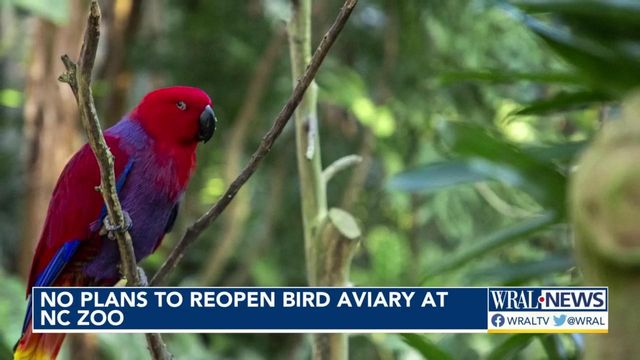Rebuilding NC Zoo's aviary would cost $50 million, zoo director says
The North Carolina Zoo is in the process of finding new homes for many of the 93 birds who live in the aviary, one of the most popular exhibits at the zoo. Officials say the 40-year-old building can't be repaired.
Posted — UpdatedThe zoo is in the process of finding new homes for many of the 93 birds representing 33 species who live there.
On Friday, North Carolina Zoo Director Pat Simmons and North Carolina Zoo Chief Bird Curator Debbie Zombeck told WRAL News that the domed building, which opened in 1982, “is just really beyond reasonable repair.”
“The aviary is a very, very special place to all of us, and it breaks our heart,” Simmons said.
The condition of the aviary
Simmons said the aviary was built for about a 30-year life cycle. The cost to replace the current aviary would be an estimated $50 million.
“We have been trying a lot of solutions to save the aviary,” Simmons said. “It’s my favorite exhibit. I’m not supposed to have one, but it is.”
Simmons said the current structure has been corroded by 40 years of the high humidity required for the exhibit. It would have to be largely rebuilt, rather than repaired.
“When the aviary closed for avian influenza, we decided let’s do a complete review and see if it’s worth doing all of that,” Simmons said.
Inspectors found that the substrate under the aviary was eroding, potentially leading to sinkholes. Aluminum tunnels under the building are "rusting in" and could collapse at some point. So rebuilding it at the current site is not an option.
WRAL News asked Simmons whether the aviary might be rebuilt at some point. She said there are no firm plans yet.
“Birds need to be at the North Carolina Zoo, and we need to have them here, and we need to do them right,” Simmons said. “So, yes, I think we would like to rebuild or build something that really showcases our birds and also showcases the professional management our staff has got and [that] helps with species conservation.”
The question may depend on the zoo's budget, which is already stretched by two large exhibits, Asia and Australia, getting underway this year. Simmons said the zoo might choose smaller exhibits for birds instead.
What happens to the birds?
Chief bird curator Debbie Zombeck has taken care of the aviary's birds for 29 years. She's been working for four weeks to find places for most of them at other AZA [Association of Zoos and Aquariums] zoos around the country. Many zoos, like the NC Zoo, are part of a breeding program for species under special protection.
It's been tough for her to see her charges go.
“I send and receive birds a lot,” Zombeck said. “That's part of what we do, especially as we're trying to set up new breeding pairs or bring new birds to the zoo for our guests to enjoy, but I've never had to send birds out in this number.
She said six birds have already been moved into the desert exhibit, and some of the older aviary birds will retire at the zoo's breeding facility, which will remain open for behind-the-scenes tours.
"I know one bird that people will be happy to see down there is our female Eclectus parrot, Princess," she said. "She is a guest favorite. Everybody is always looking for her, and she will stay here, and people will see her again."
Zombeck said she is particularly fond of Pekin robins.
“We have quite a few of those little guys out in the habitat,” Zombeck said. “They’re just beautiful, small birds.”
Simmons fancies the Victoria crowned pigeons.
“I remember when I first saw the baby Victoria crowned pigeon, I thought, ‘This is a little mini me,’” Simmons joked.
Simmons said the zoo is also working with its horticulture teams on plans to relocate 2,000 tropical plants from the aviary, representing 450 species.
• Credits
Copyright 2024 by Capitol Broadcasting Company. All rights reserved. This material may not be published, broadcast, rewritten or redistributed.






